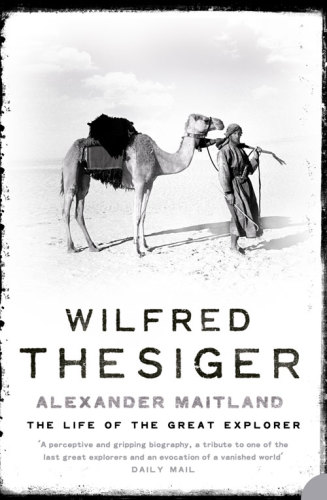
Wilfred Thesiger
The Life of the Great Explorer
- اطلاعات
- نقد و بررسی
- دیدگاه کاربران
نقد و بررسی

May 9, 2011
It's the inner journey that resonates most in this sweeping biography of a late exemplar of the British yen for exotic self-exile. Wilfred Thesiger (1910â2003), best known for epic crossings of Arabia's Empty Quarter along with classic travel memoirs and photos of his sojourns in the Middle East and Africa, was a rather minor explorer of an already well-surveyed 20th-century globe. What he sought was less a specific destination than backward tribal societies still imbued with the kind of "barbaric splendor... savagery and color" that was fast dying out in the machine age. (He did discover and attach himself to a string of handsome tribal youths and eventually developed a sideline in adolescent circumcisions.) Maitland (Speke and the Discovery of the Source of the Nile), Thesiger's longtime friend and editor, serves up a vivid account of his adventures and a perceptive portrait of a complex manâebullient hunter, repressed homosexual, man's man, and spiritual seeker who hoped that desert sand would scour clean his soul. The narrative is a ramble; as one Thesiger trek swirls into the next, it becomes clear that his life story isn't really going anywhere. Still, the scenery is magnificent, and Thesiger makes for a charismatic travel companion. Photos.

May 1, 2011
An eccentric explorer in the tradition of T.E. Lawrence, Wilfred Thesiger (1910–2003) lived with tribal warriors in Africa, traveled on camel through the Arabian desert and journeyed to the hitherto-unknown source of the Awash river in Ethiopia.
Maitland (A Tower in the Wall: Conversations with Dame Freya Stark, 1983, etc.) relies on Thesiger's extensive publications, many of which he helped edit, and he had access to personal correspondence as well as personal conversations over the 40 years of their friendship. Thesiger spent his early years in Ethiopia, where his father served in the British diplomatic service. While his childhood was a time of idyllic freedom, his education in England at the elite St. Aubyns and then Eton and Oxford was an unhappy period, in which he was beaten by sadistic headmasters for minor infractions and isolated by his peers. After graduation, he received an appointment in the Sudan Political Service, which gave him the opportunity to hunt big game and explore the wilderness areas as well as acquaint himself with tribal customs that included the murder and castration of enemies whose genitals were preserved as trophies. During World, War II, he served with British Special Forces and participated in the liberation of Ethiopia from the Italian occupation. As a big-game hunter, he was licensed to shoot two elephants per year and sought "the heaviest-tusked animals he could find." He also claimed to have killed 1,000 wild boar in 1958. The author quotes Thesiger's experiences living with Arab nomads, as "times of excitement and hardship, accidents, pig hunts [and] blood feuds." The explorer's adventures are impressive, but some of his pejorative remarks about Africans became tiresome—at certain points in the narrative, he comes across as a Colonel Blimp type character.
For those nostalgic about for the glory days of the British empire, this biography should have a certain appeal.
(COPYRIGHT (2011) KIRKUS REVIEWS/NIELSEN BUSINESS MEDIA, INC. ALL RIGHTS RESERVED.)

July 1, 2011
This authorized biography, published in the UK in 2006, will stand as the definitive work on Wilfred Thesiger (1910-2003). Maitland makes extensive use of Thesiger's letters and previous publications, e.g., My Life and Travels, which Maitland, a personal friend, edited. Thesiger had an idyllic childhood in Ethiopia (then called Abyssinia), where his father served in Britain's Foreign Office. In 1933-34, he was the first known European to journey to the end of the Awash River there. He traveled on foot with tribal guides and loved the freedom to map, hunt, and collect birds and other animals. But the biggest thrill was the danger of traveling through hostile territory. He served in the Sudan Political Service from 1935 until the outbreak of World War II, when he served in Sudan, Ethiopia, Syria, and Egypt. Following a stint as political adviser to the crown prince of Ethiopia, Thesiger joined the Middle East Anti-Locust Unit and traversed southern Arabia's deserts. Later he traveled extensively through Kurdistan and the marshes of southern Iraq. Thesiger took many photos of the tribal people he encountered, later donating over 38,000 negatives and assorted artifacts to a museum in Oxford. VERDICT Maitland's biography shows Thesiger as a (sometimes unacknowledged) giant in the field of exploration. An essential purchase for exploration collections.--Margaret Atwater-Singer, Univ. of Evansville Libs., IN
Copyright 2011 Library Journal, LLC Used with permission.

June 1, 2011
Even at the height of his career, Thesiger appeared to many a noble anachronism, and he always viewed himself as an outsider. He was one of the last of the British explorer-adventurers whose exploits were enabled by the ubiquity and power of the British Empire. For Maitland, Thesiger's friend and literary collaborator for 40 years, this biography is clearly a labor of love. But it is also balanced and doesn't avoid Thesiger's personal quirks and limitations. He was born in 1910 in Ethiopia, where his father was an official at the British legation in Addis Ababa. At Oxford he won renown as an athlete but formed few personal attachments. In fact, his closest lifelong friendship was with his mother. By his early 20s, he had begun his wanderings, which included explorations in Ethiopia and the Arabian peninsula and military service in the Sudan and North Africa. Throughout, he was a keen observer and chronicler of local cultures, and his books and photographs are considered treasures. A superb tribute to an admirable but enigmatic man.(Reprinted with permission of Booklist, copyright 2011, American Library Association.)




دیدگاه کاربران